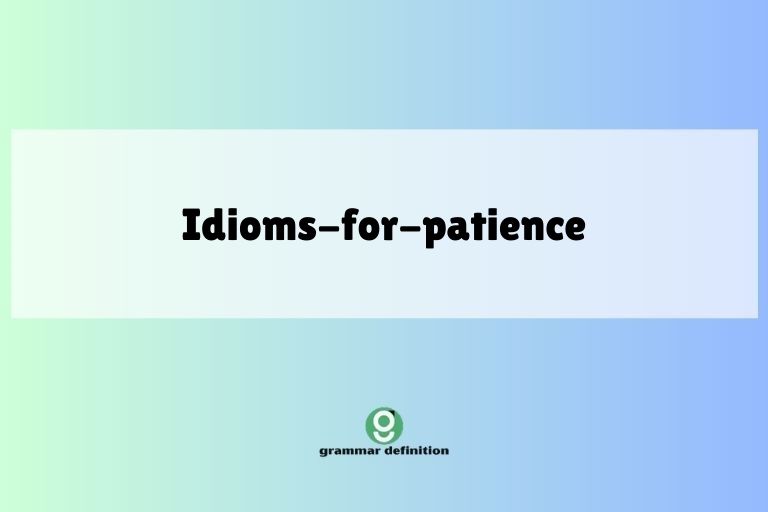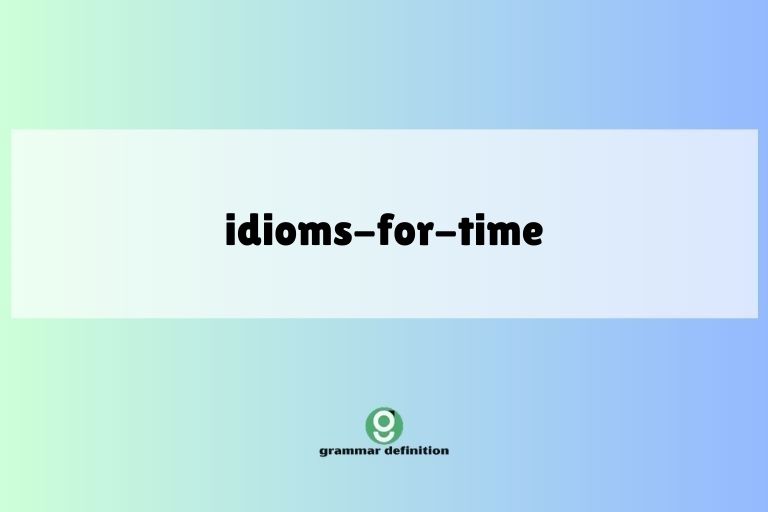Idioms for Silence: A Comprehensive Guide

Silence, often more powerful than words, holds a significant place in communication. The English language offers a rich array of idioms to express various aspects of silence, from choosing to remain quiet to being forced into silence.
Understanding these idioms enhances your ability to comprehend nuanced meanings and express yourself more effectively. This article provides a comprehensive exploration of idioms related to silence, their meanings, usage, and examples.
Whether you’re an ESL learner or a native speaker aiming to refine your language skills, this guide will equip you with the knowledge to master these expressions.
This article is designed for English language learners, teachers, and anyone interested in expanding their vocabulary and improving their understanding of idiomatic expressions. By exploring these idioms, you’ll gain a deeper appreciation for the subtleties of the English language and improve your ability to communicate effectively in various contexts.
Table of Contents
- Introduction
- Definition of Idioms for Silence
- Structural Breakdown of Idioms
- Types and Categories of Silence Idioms
- Examples of Idioms for Silence
- Usage Rules for Idioms of Silence
- Common Mistakes with Silence Idioms
- Practice Exercises
- Advanced Topics
- FAQ
- Conclusion
Definition of Idioms for Silence
Idioms are expressions whose meanings cannot be understood from the literal meanings of the individual words. Idioms for silence are phrases or expressions that describe different types of silence, the reasons for it, or the act of ending it.
These idioms often convey a deeper meaning related to communication, social dynamics, or emotional states.
Classification: Idioms related to silence can be classified based on the type of silence they describe: choosing to be silent, being forced into silence, general quietness, or the act of ending silence. They can also be categorized by the emotional tone they convey, such as regret, defiance, or resignation.
Function: The function of these idioms is to add color and depth to language. They allow speakers and writers to express complex ideas about silence in a concise and evocative way. They also reflect cultural attitudes towards silence and communication.
Contexts: Idioms for silence are used in a variety of contexts, including literature, journalism, everyday conversation, and formal speeches. Understanding the context is crucial for interpreting the meaning of an idiom correctly. For example, “mum’s the word” would be appropriate when keeping a secret, while “clam up” describes sudden unwillingness to speak.
Structural Breakdown of Idioms
Idioms, by their nature, often defy standard grammatical rules. Their structure is fixed, and attempting to alter them usually results in a loss of meaning or an awkward expression.
However, understanding the basic structure can help in recognizing and using them correctly.
Many idioms for silence take the form of phrasal verbs, which consist of a verb and a preposition or adverb (e.g., “clam up,” “pipe down”). Others are fixed phrases or expressions that cannot be changed without losing their idiomatic meaning (e.g., “mum’s the word,” “a vow of silence”).
The structure of an idiom is often what makes it distinct and memorable. The unusual combination of words creates a vivid image or metaphor that conveys the intended meaning.
For example, the image of a clam tightly closing its shell is used to represent someone becoming suddenly silent (“clam up”).
Consider the following examples to illustrate the structural diversity:
- Phrasal Verb: Shut up (verb + adverb)
- Fixed Phrase: Mum’s the word (noun + verb + article + noun)
- Metaphorical Expression: Silence is golden (noun + verb + adjective)
Types and Categories of Silence Idioms
Idioms for silence can be categorized based on the type of silence they describe. Understanding these categories can help you choose the most appropriate idiom for a given situation.
Idioms for Choosing Silence
These idioms describe situations where someone intentionally chooses to remain silent, often for strategic or personal reasons.
- Hold one’s tongue: To refrain from speaking, even when one wants to.
- Bite one’s tongue: Similar to “hold one’s tongue,” but often implies a stronger urge to speak.
- Keep mum: To remain silent or secretive.
- Mum’s the word: An agreement to keep something secret.
- Button one’s lip: To stop talking.
Idioms for Enforced Silence
These idioms describe situations where someone is forced or compelled to be silent, often against their will.
- Shut someone up: To force someone to be quiet.
- Gag someone: To prevent someone from speaking or expressing their opinion.
- Silence someone: To suppress someone’s voice or opinion.
- Muzzle someone: To prevent someone from expressing their opinion, often through censorship.
- Put a sock in it: A rude way of telling someone to be quiet.
Idioms for General Silence or Quietness
These idioms describe a general state of quietness or lack of noise.
- Quiet as a mouse: Very quiet.
- Still waters run deep: A quiet or reserved person may have hidden depths of knowledge or emotion.
- Drop a pin: Used to describe a very quiet environment.
- You could hear a pin drop: Similar to “drop a pin,” used when a room becomes suddenly silent.
- The silence is deafening: The silence is so intense that it feels overwhelming.
Idioms for Breaking Silence
These idioms describe the act of ending a period of silence, often after a long or significant pause.
- Break the silence: To be the first to speak after a period of silence.
- Speak up: To express one’s opinion or voice one’s concerns.
- Find one’s voice: To gain the confidence to express oneself.
- Get something off one’s chest: To reveal something that has been bothering one.
- Spill the beans: To reveal a secret.
Examples of Idioms for Silence
The following sections provide extensive examples of each category of silence idioms, illustrating their usage in various contexts.
Examples of Choosing Silence
This table provides examples of idioms related to intentionally choosing to remain silent. Each example includes the idiom, its meaning, and its usage in a sentence.
| Idiom | Meaning | Example Sentence |
|---|---|---|
| Hold one’s tongue | To refrain from speaking, even when one wants to. | I wanted to argue, but I had to hold my tongue to avoid a fight. |
| Bite one’s tongue | To refrain from speaking, often with difficulty. | She had to bite her tongue to keep from saying something rude. |
| Keep mum | To remain silent or secretive. | We decided to keep mum about the surprise party. |
| Mum’s the word | An agreement to keep something secret. | “Mum’s the word,” she whispered, “don’t tell anyone.” |
| Button one’s lip | To stop talking. | The teacher told him to button his lip and pay attention. |
| Sit on one’s hands | To refrain from taking action or interfering. | Although he disagreed with the plan, he decided to sit on his hands and let it proceed. |
| Say nothing | To remain completely silent. | When asked about the incident, he chose to say nothing. |
| Give the silent treatment | To refuse to speak to someone as a form of punishment or disapproval. | After their argument, she gave him the silent treatment for two days. |
| Take a vow of silence | To make a commitment to remain silent for a period of time. | He took a vow of silence to reflect on his life. |
| Not breathe a word | To not reveal a secret. | I promised I wouldn’t breathe a word about their engagement. |
| Zip it | To be quiet. | The librarian told the children to zip it. |
| Shut one’s trap | To be quiet (rude). | He was told to shut his trap after interrupting the speaker. |
| Hold back | To restrain oneself from saying something. | She wanted to tell him how she felt, but she held back. |
| Keep quiet | To refrain from speaking. | Please keep quiet during the performance. |
| Say no more | To indicate that no further explanation is needed. | “I understand, say no more,” she replied. |
| Deafening silence | A silence that feels loud or oppressive. | Her rejection was met with deafening silence. |
| Silence is golden | Remaining silent is sometimes better than speaking. | In this situation, remember that silence is golden. |
| Not say a word | To remain completely silent. | He promised to not say a word about what he saw. |
| Say nothing at all | To maintain complete silence. | She decided to say nothing at all to avoid escalating the conflict. |
| Refrain from speaking | To consciously avoid talking. | He had to refrain from speaking to avoid giving away the surprise. |
| Swallow one’s words | To stop oneself from saying something, often because it might be hurtful or inappropriate. | She wanted to criticize his work, but she swallowed her words. |
| Stifle a laugh | To suppress a laugh. | She tried to stifle a laugh during the serious lecture. |
Examples of Enforced Silence
This table provides examples of idioms related to being forced or compelled to be silent.
| Idiom | Meaning | Example Sentence |
|---|---|---|
| Shut someone up | To force someone to be quiet. | The bully tried to shut him up by shouting over him. |
| Gag someone | To prevent someone from speaking or expressing their opinion. | The dictator tried to gag the press by censoring their articles. |
| Silence someone | To suppress someone’s voice or opinion. | The company tried to silence the whistleblower by firing him. |
| Muzzle someone | To prevent someone from expressing their opinion, often through censorship. | The government attempted to muzzle dissenting voices by restricting internet access. |
| Put a sock in it | A rude way of telling someone to be quiet. | “Put a sock in it!” he yelled, “I’m trying to concentrate.” |
| Keep under wraps | To keep something secret or hidden. | The details of the project were kept under wraps until the official announcement. |
| Quash a rumor | To suppress or put an end to a rumor. | The company president tried to quash the rumor about layoffs. |
| Clamp down on | To take strict measures to suppress something. | The authorities clamped down on dissent after the protests. |
| Stifle dissent | To suppress opposition or disagreement. | The regime used force to stifle dissent. |
| Curtailed speech | To restrict the amount of speaking one can do. | The new rules curtailed speech at public gatherings. |
| Hold hostage | To hold someone captive and prevent them from speaking freely. | The kidnappers held her hostage and prevented her from contacting anyone. |
| Smother a voice | To suppress or silence someone’s voice. | The powerful lobby tried to smother the voice of the small business owner. |
| Force into silence | To compel someone to be quiet. | They tried to force him into silence by threatening his family. |
| Shut down | To stop someone from speaking or operating. | The moderator had to shut down the debate because it became too heated. |
| Pressured into silence | To be coerced into remaining quiet. | She was pressured into silence by her colleagues. |
| Stilled voice | A voice that has been silenced. | The dictator’s actions resulted in many stilled voices. |
| Silenced forever | To be permanently prevented from speaking. | The journalist was silenced forever for reporting the truth. |
| Under a veil of secrecy | To be hidden or kept secret. | The project was conducted under a veil of secrecy. |
| Keep lid on something | To keep something secret. | The government tried to keep a lid on the scandal. |
| Forbid from speaking | To prohibit someone from talking. | He was forbidden from speaking about the case. |
| Suppress the truth | To prevent the truth from being known. | They attempted to suppress the truth about the accident. |
| Shut one’s mouth | To be quiet (rude). | He was told to shut his mouth and listen. |
Examples of General Silence
This table provides examples of idioms related to a general state of quietness or lack of noise.
| Idiom | Meaning | Example Sentence |
|---|---|---|
| Quiet as a mouse | Very quiet. | The children were quiet as a mouse while the teacher read the story. |
| Still waters run deep | A quiet or reserved person may have hidden depths of knowledge or emotion. | He’s a quiet man, but remember, still waters run deep. |
| Drop a pin | Used to describe a very quiet environment. | You could drop a pin in the library; it was so silent. |
| You could hear a pin drop | Used when a room becomes suddenly silent. | When the announcement was made, you could hear a pin drop. |
| The silence is deafening | The silence is so intense that it feels overwhelming. | After the argument, the silence was deafening. |
| Dead silence | Complete silence. | Dead silence followed the comedian’s failed joke. |
| Eerie silence | A silence that is unsettling or strange. | An eerie silence fell over the forest as the storm approached. |
| Peace and quiet | A state of calmness and tranquility. | All I want is some peace and quiet after a long day at work. |
| Hush falls over | Silence descends upon a place. | A hush fell over the crowd as the singer began to perform. |
| As quiet as the grave | Extremely quiet. | The house was as quiet as the grave after everyone went to sleep. |
| Serene silence | A peaceful and calm silence. | The serene silence of the mountains was incredibly relaxing. |
| A lull in the conversation | A temporary pause in a conversation. | There was a lull in the conversation as everyone thought about what to say next. |
| A moment of silence | A brief period of quiet reflection. | We observed a moment of silence to honor the victims. |
| A hushed atmosphere | A quiet and subdued environment. | The library had a hushed atmosphere. |
| Stillness of the night | The quietness of the night. | He enjoyed the stillness of the night. |
| Deathly quiet | Extremely quiet, suggestive of death. | The house was deathly quiet after the family left. |
| A silent night | A peaceful and quiet night. | It was a silent night, perfect for stargazing. |
| Silent treatment | Refusing to speak to someone. | She gave him the silent treatment after their argument. |
| Ominous silence | A silence that suggests something bad is about to happen. | An ominous silence hung in the air before the storm. |
| Complete quiet | Total silence. | We need complete quiet in the examination room. |
| Pin could be heard | Very quiet. | The room was so quiet, a pin could be heard. |
| A silent observer | Someone who watches without speaking. | He remained a silent observer throughout the meeting. |
Examples of Breaking Silence
This table provides examples of idioms related to ending a period of silence.
| Idiom | Meaning | Example Sentence |
|---|---|---|
| Break the silence | To be the first to speak after a period of silence. | She finally broke the silence and asked what was wrong. |
| Speak up | To express one’s opinion or voice one’s concerns. | If you have any questions, please speak up. |
| Find one’s voice | To gain the confidence to express oneself. | After years of being shy, she finally found her voice. |
| Get something off one’s chest | To reveal something that has been bothering one. | I need to get something off my chest; I’ve been feeling guilty. |
| Spill the beans | To reveal a secret. | He accidentally spilled the beans about the surprise party. |
| Let the cat out of the bag | To reveal a secret, often unintentionally. | She let the cat out of the bag when she mentioned their vacation plans. |
| Air one’s views | To express one’s opinions publicly. | He used the platform to air his views on climate change. |
| Voice an opinion | To express an opinion. | She decided to voice her opinion on the matter. |
| Speak one’s mind | To say what one thinks, even if it’s controversial. | He always speaks his mind, regardless of the consequences. |
| Come clean | To confess or admit something. | He decided to come clean about his mistake. |
| Open up | To become more communicative and share one’s feelings. | It took a while, but eventually, he opened up about his problems. |
| Shatter the silence | To abruptly end a period of silence. | A loud crash shattered the silence of the night. |
| Break one’s silence | To end a period of silence, especially after a long time. | After years of silence, she decided to break her silence and tell her story. |
| Find the words | To be able to express oneself after a period of silence or difficulty. | He struggled to find the words to express his grief. |
| Raise one’s voice | To speak out or protest. | She decided to raise her voice against injustice. |
| Bring to light | To reveal or make something known. | The investigation brought to light several instances of corruption. |
| Speak out against | To publicly criticize or oppose something. | He decided to speak out against the new policy. |
| Tell all | To reveal all the details of something, often a scandal. | He promised to tell all in his autobiography. |
| Unleash a tirade | To suddenly start speaking angrily and critically. | He unleashed a tirade against the company’s management. |
| Voice concerns | To express worries or anxieties. | Many employees voiced their concerns about the new changes. |
| Sing like a canary | To confess or give information to the authorities. | The suspect finally sang like a canary after hours of questioning. |
| Unburden oneself | To relieve oneself of something that is weighing on one’s mind. | She needed to unburden herself and tell someone about her problems. |
Usage Rules for Idioms of Silence
Using idioms correctly involves understanding their specific meanings, contexts, and grammatical structures. While idioms often break conventional grammar rules, there are still guidelines to follow to ensure proper usage.
1. Context is Key: Always consider the context in which you’re using an idiom. The same idiom can have different connotations depending on the situation. For example, “shut up” can be a rude command or a surprised exclamation.
2. Fixed Structure: Idioms have a fixed structure, and changing the words can alter or negate their meaning. Avoid substituting words or rearranging the order unless you’re sure it’s acceptable.
3. Audience Awareness: Be mindful of your audience. Some idioms are informal or even rude, and should be avoided in formal settings. “Put a sock in it,” for example, is generally considered impolite.
4. Figurative Meaning: Remember that idioms are figurative expressions. Don’t interpret them literally. For instance, “spill the beans” doesn’t involve actual beans.
5. Verb Tense and Agreement: Ensure that the verb tense and agreement within the idiom match the context of your sentence. For example, “He had to bite his tongue” (past tense) vs. “He has to bite his tongue” (present tense).
6. Cultural Sensitivity: Some idioms may have cultural or regional variations. Be aware of these differences to avoid misunderstandings.
7. Avoid Overuse: While idioms can add color to your language, overuse can make your writing or speech sound unnatural or forced. Use them sparingly and appropriately.
Common Mistakes with Silence Idioms
Using idioms incorrectly can lead to confusion or miscommunication. Here are some common mistakes to avoid:
| Incorrect | Correct | Explanation |
|---|---|---|
| Hold your tongues. | Hold your tongue. | “Hold your tongue” is the correct form; “tongues” is incorrect. |
| Mum is a word. | Mum’s the word. | “Mum’s the word” is the correct idiom, meaning “keep it secret.” |
| Button your lips. | Button your lip. | The idiom is “button your lip,” not “lips.” |
| Break the silent. | Break the silence. | The correct noun is “silence,” not “silent.” |
| Spill the bean. | Spill the beans. | The idiom is “spill the beans,” plural. |
| Let a cat out of the bag. | Let the cat out of the bag. | The article “the” is required in the idiom. |
| Saying his mind. | Speaking his mind. | Correct verb is “speaking”. |
| Heared a pin drop. | Heard a pin drop. | Correct past tense is “heard”. |
| Still water runs deeply. | Still waters run deep. | “Still waters run deep” is the fixed idiom. |
| Quiet as a mousey. | Quiet as a mouse. | The correct comparison is “quiet as a mouse.” |
Practice Exercises
Test your understanding of silence idioms with these practice exercises. Each exercise consists of 10 questions.
Choose the best idiom to complete each sentence.
Exercise 1: Fill in the Blanks
| Question | Answer |
|---|---|
| 1. I wanted to argue, but I had to ________ to avoid a fight. | hold my tongue |
| 2. “________,” she whispered, “don’t tell anyone.” | Mum’s the word |
| 3. The teacher told him to ________ and pay attention. | button his lip |
| 4. After the argument, ________ was deafening. | the silence |
| 5. She finally ________ and asked what was wrong. | broke the silence |
| 6. If you have any questions, please ________. | speak up |
| 7. He accidentally ________ about the surprise party. | spilled the beans |
| 8. The children were ________ while the teacher read the story. | quiet as a mouse |
| 9. He’s a quiet man, but remember, ________. | still waters run deep |
| 10. The dictator tried to ________ the press by censoring their articles. | gag |
Exercise 2: Multiple Choice
| Question | Options | Answer |
|---|---|---|
| 1. Which idiom means to reveal a secret? | (a) Hold one’s tongue (b) Spill the beans (c) Keep mum (d) Bite one’s tongue | (b) Spill the beans |
| 2. Which idiom means to stop talking? | (a) Speak up (b) Break the silence (c) Button one’s lip (d) Find one’s voice | (c) Button one’s lip |
| 3. Which idiom describes a very quiet environment? | (a) The silence is deafening (b) Quiet as a mouse (c) Drop a pin (d) Still waters run deep | (c) Drop a pin |
| 4. Which idiom means to force someone to be quiet? | (a) Muzzle someone (b) Speak up (c) Find one’s voice (d) Break the silence | (a) Muzzle someone |
| 5. Which idiom means to gain the confidence to express oneself? | (a) Break the silence (b) Find one’s voice (c) Spill the beans (d) Keep mum | (b) Find one’s voice |
| 6. Which idiom suggests it’s better to be silent than to speak? | (a) Deafening silence (b) Still waters run deep (c) Silence is golden (d) Quiet as a mouse | (c) Silence is golden |
| 7. What does “put a sock in it” mean? | (a) To reveal a secret (b) To be quiet (c) To agree to be silent (d) To hold one’s tongue | (b) To be quiet |
| 8. What is meant by “taking a vow of silence”? | (a) Promising to speak more (b) Promising to keep a secret (c) Committing to remain silent (d) Agreeing to break the silence | (c) Committing to remain silent |
| 9. Which idiom indicates someone is being pressured to stay silent? | (a) Silenced forever (b) Pressured into silence (c) Speak your mind (d) Find one’s voice | (b) Pressured into silence |
| 10. Which idiom describes someone who is extremely quiet? | (a) Quiet as a mouse (b) A silent night (c) Ominous silence (d) Complete quiet | (a) Quiet as a mouse |
Advanced Topics
For advanced learners, exploring the nuances of silence idioms can involve examining their historical origins, cultural significance, and literary applications.
Historical Origins: Many idioms have roots in historical events, social customs, or literary works. Understanding these origins can provide deeper insights into their meanings and usage. For example, the phrase “spill the beans” may originate from ancient Greece, where beans were used as ballots, and overturning the container revealed the votes.
Cultural Significance: Silence and communication are viewed differently across cultures. Some cultures value silence as a sign of respect or contemplation, while others prioritize open and direct communication. Idioms for silence reflect these cultural values.
Literary Applications: Authors often use silence idioms to create atmosphere, develop characters, and convey themes. Analyzing their use in literature can enhance your understanding of their expressive potential. For example, a character who “holds their tongue” might be portrayed as repressed or strategic.






